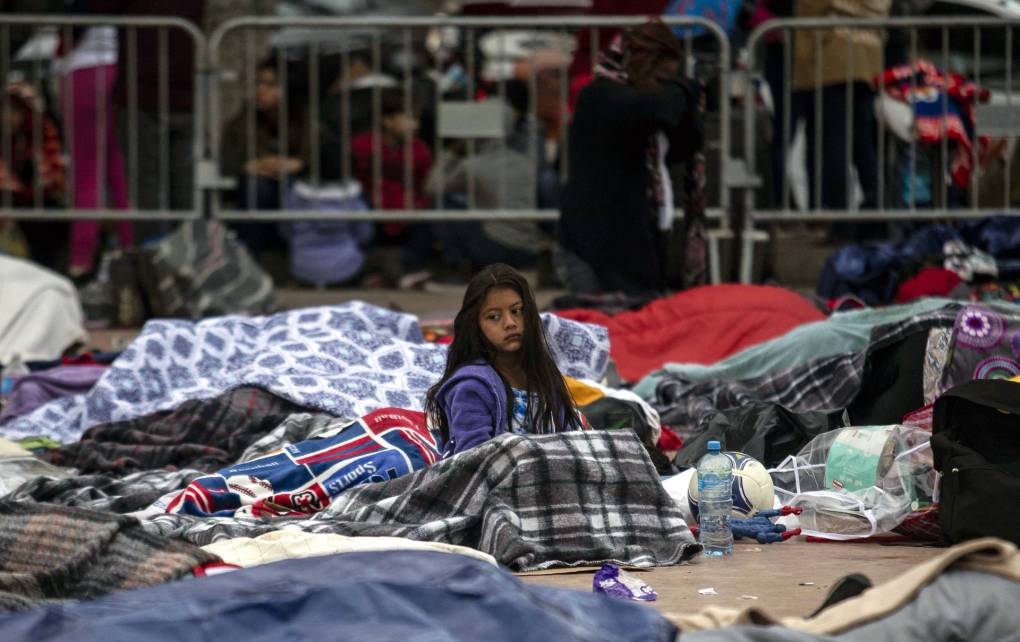Robo dogs. Tasers-equipped drone. Lie detectors. Smart walls. Iris scans. The imprecise, inhumane technology of AI algorithms.
This is the arsenal that migrants and their families now face when they flee horrific conditions in their native countries. If they survive perilous journeys by boat across the Mediterranean Sea, or on foot across the Sonoran Desert, they are treated like criminals, often brutalized and locked up for years in unsanitary detention camps without due process.
Their “crime”? Trying against all odds to find a safe haven and a better life in the United States and across Europe.
In a new book, The Walls Have Eyes (The New Press, 2024), lawyer and anthropologist Petra Molnar shows in heartbreaking narratives and well-sourced research that the prevention of asylum and migration is now a big business on our planet.
“Corporate interests prey upon anxieties about migration,” Molnar writes. She notes that the technologies I listed above are part of “a global multibillion-dollar border industrial complex, involving everyone from obscure Israeli surveillance companies to well-known players like Airbus, Accenture, Palantir, and Thomas Reuters, to name but a few.”
Border anxieties perpetuated by politicians who use jacked-up rhetoric to grab power while doling out these multibillion-dollar contracts have greased the wheels of oppression to create a new form of Western colonization.
‘Migrant Invasion’
Look no further than the United States. In the 2024 Republican platform that presidential candidate Donald Trump will enact if elected, the number one priority is not the economy, healthcare, veterans, or climate change. Instead, screams the platform in upper caps, “SEAL THE BORDER, AND STOP THE MIGRANT INVASION.”
“We will complete the Border Wall, shift massive portions of Federal Law Enforcement to Immigration Enforcement, and use advanced technology to monitor and secure the Border.”
The second policy for the GOP? “CARRY OUT THE LARGEST DEPORTATION OPERATION IN AMERICAN HISTORY.”
Later in the document: “Stop the migrant crime epidemic.”
Epidemic? Hardly. Last year the Stanford Institute for Economic Policy Research did an exhaustive study titled The mythical tie between immigration and crime.
Researchers found that for over 140 years, “first-generation immigrants have not been more likely to be imprisoned than people born in the United States since 1880.
“Today, immigrants are 30 percent less likely to be incarcerated than are U.S.-born individuals who are white, the study finds…the likelihood of an immigrant being incarcerated is 60 percent lower than of people born in the United States.”
“From Henry Cabot Lodge in the late 19th century to Donald Trump, anti-immigration politicians have repeatedly tried to link immigrants to crime, but our research confirms that this is a myth and not based on fact,” said Ran Abramitzky, lead author of the study.
Money to Be Made
But facts (and humanity) be damned when there is money to be made from exclusion.
When it comes to the criminalization of the “Other,” Europe is no better. Molnar reports that, according to the Transnational Institute, the “European Union is directly involved in supporting detention in at least twenty-two countries, funding the construction of detention centers and related infrastructure including providing surveillance technology, training guards, and even exerting political pressure on governments to crack down on migration.”
This despite the 1951 Refugee Convention that grants certain rights to refugees, including in Article 16, “free access to the courts of law” in the nation that they have fled to.
Too often that right to an attorney is denied through the arrest and incarceration of refugees in migrant camps. Molnar notes that there are “nearly 1,400 detention centers worldwide,” some completely privately run.
Israel is a “leader” in border surveillance technology. Elbit Systems employs 18,000 and had a revenue of $5.28 billion in 2021, according to Molnar. She also witnessed how that spy technology is often first tested on Palestinians in Gaza. A former Israeli soldier told her, “How do we control the Palestinians? We make them feel like we are everywhere. We are not only invading your home but also your private digital space.” (This begs the question: how did it miss the surprise attack by Hamas?)
Controlling poorer, desperate populations in countries where conditions have deteriorated because of wealthier nations is not new. It is today’s form of colonialism.
In the book This Land is Our Land (FSG, 2019), Suketu Mehta recalls a confrontation his grandfather had in London when a British man “wagged a finger in his face” and asked “Why are you in my country?”
‘“Because we are the creditors,” responded my grandfather, who was born in India, worked all his life in colonial Kenya, and was now retired in London. ‘You took all our wealth, our diamonds. Now we have come to collect.”’
Mehta, regarding the way rich countries exploit the poor, “…they fouled the air above us and waters around us, making our farms barren, our oceans lifeless; and they were aghast when the poorest among us arrived at their borders…”
They will not stop arriving. The bill we have amassed is overdue. Time to pay up.


